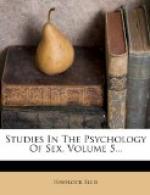The saint, also, is here at one with the lover and the artist. The man who has so profoundly realized the worth of his fellow men that he is ready even to die in order to save them, feels that he has discovered a great secret. Cyples traces the “secret delights” that have thus risen in the hearts of holy men to the same source as the feelings generated between lovers, friends, parents, and children. “A few have at intervals walked in the world,” he remarks, “who have, each in his own original way, found out this marvel.... Straightway man in general has become to them so sweet a thing that the infatuation has seemed to the rest of their fellows to be a celestial madness. Beggars’ rags to their unhesitating lips grew fit for kissing, because humanity had touched the garb; there were no longer any menial acts, but only welcome services.... Remember by how much man is the subtlest circumstance in the world; at how many points he can attach relationships; how manifold and perennial he is in his results. All other things are dull, meager, tame beside him."[69]
It may be added that even if we still believe that lover and artist and saint are drawing the main elements of their conceptions from the depths of their own consciousness, there is a sense in which they are coming nearer to the truth of things than those for whom their conceptions are mere illusions. The aptitude for realizing beauty has involved an adjustment of the nerves and the associated brain centers through countless ages that began before man was. When the vision of supreme beauty is slowly or suddenly realized by anyone, with a reverberation that extends throughout his organism, he has attained to something which for his species, and for far more than his species, is truth, and can only be illusion to one who has artificially placed himself outside the stream of life.




